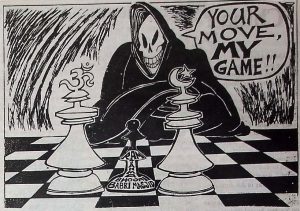
NEW DELHI: The foundation stone laying ceremony for a temple at Ayodhya (Uttar Pradesh) continues to be a major campaign issue with both the Congress (1) Party and the opposition accusing each other of trying to get political mileage out of it.
The issue has been kept alive by the comments made by the leaders of Pakistan, Iran and Saudi Arabia on the subject.
‘The three countries had expressed their “concern” over what they called “discretion of a Muslim religious place” following foundation laying ceremony of a temple near the disputed temple Mosque (Babri Masjid Ram Janam Bhoomi) site at Ayodhya by some Hindu fundamentalist groups.
Opposition Janata Dal spokesman Yashwant Sinha, on the other hand, said Bhutto’s criticism was a deliberate attempt aimed at helping Rajiv Gandhi and his party to consolidate the Hindu support.
Homi Daiji, Secretary of the National Council of the Communist Party of India (CPI), said in Bhubaneswar (Orissa) that these Islamic countries had “no business to interfere in our internal affairs” as they were not secular while India was.
The Ayodhya issue also had rumblings within the Congress(1) camp and the office bearers of the Aligarh Muslim University ( Uttar Pradesh) unit of the National Stu dents Union of India (NSUL), the party’s student wing, have resigned and joined the Janata Dal, protesting alleged Congress support to the “Shilanyas” (Foundation laying) ceremony.
Meanwhile, the Lok Dal (B) releasing its election manifesto, promised unemployment allowance to landless farmers and industrialization of Rural areas.
The Srinagar (Jammu and Kashmir) Lok Sabha seat has gone uncontested the National Conference, while elections in Shahdole (Madhya Pradesh), South Goa and Duragapur (West Bengal) have been countermanded following the death of candidates.
A total of 498 million electorate will decide the fate of about 7,000 candidates.
The major opposition paresis are united in criticizing as “the economic and educational policies pursued by the Federal Government during the last five years.
The National Front alleges that there has been increasing subservience to foreign capital “in order to satisfy the demand pattern of the affluent 10 percent population”.
Its manifesto promises to give preference in its industrial policy to the production of “wage goods and services required for consumption by the mass of our people”.
The rightwing Bhartiya Janata Party’s manifesto says that as a result of wrong plan prion ties the country is producing more color TV sets, more computers and “more fancy cars but not enough buses, more superfine fabrics but not enough cheaper varieties of cloth”.
Rejecting “both exploitative capitalism and suppressive communism”, it promises to “give the country a humane economy” through decentralization of economic power which is “presently concentrated in the hands of the state or of big business.
The two communist parties as well as the National Front and the BJP want the right to work to be incorporated in the constitution as a fundamental right.
On educational policy, the CPI condemns the government for what it calls giving up the aim of universal primary education en visage in the Constitution.
It demands the scrapping of the “elitist educational system call Navodaya schools in which hand picked students are given in house education and reared as a special chosen class”.
This policy, the GPI’s manifesto says, will mean that India will continue to be the country with the biggest illiterate population, “rather a strange way of going into the 21st century.”
Article extracted from this publication >> November 24, 1989